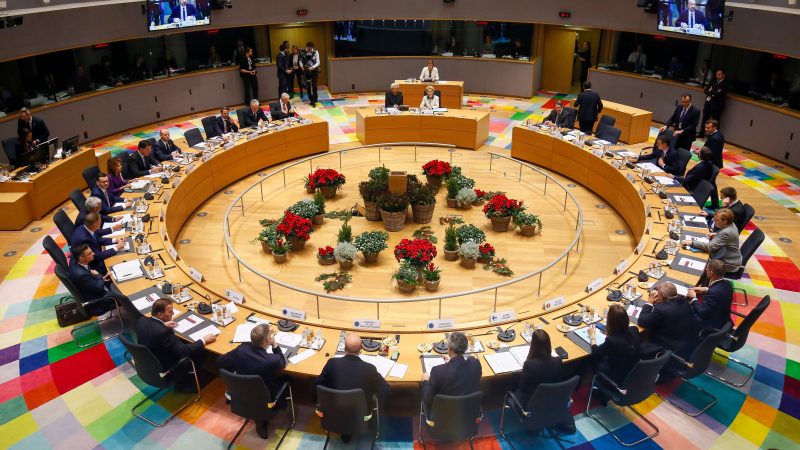- European Union leaders decided in the early hours of Friday morning to put their pledge to support Ukraine for “as long as it takes” to the test by agreeing to provide the war-torn country with “future security commitments”.
“The European Union and Member States stand ready to contribute, together with partners, to future security commitments to Ukraine, which will help Ukraine defend itself in the long term, deter acts of aggression, and resist destabilization efforts,” EU heads of states agreed to in the conclusions of the two-day summit of the European Council.
“These commitments will be taken in full respect of the security and defense policy of certain member states and taking into account the security and defense interests of all member states,” they added.
The aim, an EU official told reporters, is to replace the bloc’s band-aid approach to Ukraine with long-term financial, humanitarian, and military assistance to help it meet its needs over the coming years so that it can not only survive the war and arrive at the negotiating table with Russia in a powerful position but also integrate further into the EU and NATO to facilitate membership.
This comes just two weeks before leaders from the 31 members of NATO will convene in the Lithuanian capital to discuss security guarantees for Ukraine, Ukrainian membership as well as the ongoing transformation of the military alliance.
“It’s actually commendable that the EU is now thinking about this. I think there’s clearly a move designed to pre-empt also the NATO summit,” Bruno Lété, senior fellow on security and defense at the German Marshall Fund of the United States, told reporters.
“I think in an ideal world, Ukraine is looking for anything that resembles NATO’s Article 5. Ukraine wants hard military guarantees, that’s the ultimate goal. But I think Ukraine’s also realistic enough to understand that the West is perhaps not prepared to go that far for now.
“So I guess what Ukraine realistically would be looking for is at least ensuring a steady flow of weapons, ensuring exchange of advanced technology, and, of course, plenty of political guarantees that it can further integrate towards the EU and with NATO,” he added.
‘A very strong political message’
What shape or form these EU commitments will take remains to be defined by heads of state but the addition of these commitments in the conclusion, following a push by France, was described by an EU diplomat as “a very strong political message” to both Ukraine and Russia.
Belgian Prime Minister Alexander De Croo told reporters after the first day of the summit wrapped up in the early hours of Friday morning that the member states “are already giving many security elements without this being translated into concrete security guarantees. But we can see that the discussion and the approach are taking shape. “
Crucially, the wording of the conclusions would allow the various member states to provide what they are comfortable with as several countries – Austria, Ireland, and Malta – are neutral and therefore would not want to provide lethal military equipment. But it will also allow others to go beyond EU instruments and provide further commitments bilaterally or through other fora including NATO.
This would likely to embraced by France and Germany which, with the US and UK, form the so-called Quartet.
French President Emmanuel Macron said in Bratislava last month that “it is in our interest for it (Ukraine) to have credible security guarantees with us in a multilateral framework, with either multilateral or bilateral support”.
German Chancellor Olaf Scholz, meanwhile, told reporters upon arrival at the summit that “we need a strategy on how to support Ukraine in the fight for independence and integrity and sovereignty.”
“Germany, as you all know, is Ukraine’s second-largest supporter after the US,” he said, citing artillery and air defense weapons as examples of what Berlin provided. “And we will continue to do that (…) and that ties in with what I can report from talking to them (the US) and the British Prime Minister, the French President, also from talking to the Polish Prime Minister.”
Training, military equipment, financial assistance
Some of these commitments are likely to be long-term versions of what the bloc has already managed to roll out within the first year of Russia’s aggression against Ukraine.
The European Commission more or less proposed exactly that last week when it urged member states to agree to a €66 billion top-up of the EU’s current multi-year budget including €50 billion that would be used to provide “predictable financial support for Ukraine” over the coming four years. This comes on top of the €18 billion in financial assistance member states agreed to late last year to cover Ukraine’s basic budgetary needs for 2023.
A boost to the EU’s training mission for Ukrainian troops could also be in the offing. EU member states have pledged to train 30,000 troops before the end of 2023, and have already provided training to over 24,000.
A spin-off of the European Peace Facility (EPF), an off-budget fund through which member states get partially reimbursed for military equipment they donate to partner countries, that would be solely dedicated to Ukraine could also materialize.
The EPF initially had a budget of €5.7 billion for the 2021-2027 period but has since had to be topped up twice more due to Ukraine’s needs and has ballooned to about €12 billion.
Josep Borrell, the bloc’s top diplomat, appeared to back the idea on Thursday telling reporters that military support for Ukraine “has to be in the long term: during the war and after the war”.
“You have to make Ukraine able to defend. So the European peace facility for Ukraine, maybe it has to become a new Ukrainian defense fund,” he added.
Source: Euronews






